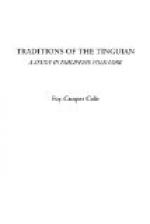“Cousin Dumalagan, Cousin Agyokan; the enemy—the old one—has killed my brother Aponitolau at the Sayang of Gawigawen of Adasin, so says the hawk.” After that they started and soon arrived in Adasin. They began at the south end of the town and killed so many it looked as though they were cutting down banana trees. “Look down, Aponitolau, and see if you know the men who are destroying the town.” Aponitolau truly looked. “Why, Cousin Dumalagan and Cousin Agyokan, do you destroy the town?” “Because the hawk reported to Aponigawani that you had been killed by the old enemy in the town of Adasin, and she has thrown away her upper arm beads [200] by the gate of Kadalayapan.”
“Ala! you stop. Ala! You who live, join their heads and their bodies; you join all,” he said. “I will spit once and they will appear as if they were not cut at all. I will whip my perfume which is banowes, they quickly breathe. I whip my perfume which is alikadakad (clatter), and they quickly stand up. I whip my perfume which is dagimonau (monau—just awakened) and they quickly recover.” [201] “Oh, how long we have slept,” they said. “How long we have slept, you say, and you have been dead.” “Oh, how powerful are the people of Kadalayapan! Even if we die, we may hope to live again at once,” they said, and all went up to the house of Gawigawen.
“Now Dalinmanok of Dalinapoyan, Dumpoga of Dagala, Ligi of Madagitan and Ligi of Dagopan, expect me in two months’ time, for I shall come to fight you.” After that they agreed and everybody went home. When they arrived at Kadalayapan there were no upper arm beads on Aponigawani, for she believed the hawk when it told her Aponitolau was dead. “No, I am not dead, but when two months have passed I shall go to fight Dalinmanok and his companions.”
“When you went to sail, did you not find the switch which belongs to Aponibolinayen? They are now making a ceremony to find it.” “It is here, that which I picked up in the shade of the pamlo-ongen tree, and I will take it back when I go to fight.”
Not long after that, according to the custom of the story, the second month came. “Old men who know the signs and very old women, come and see the liver and gall sack, because I go to fight.” After that they all gathered, they caught the pig and cut it in large pieces. “Ala, old men who know the signs and very old women, come and see the gall, for I go to fight.” [202] “This is better than your grandfather had when he consulted the gall. How fearful you will be to the town which you go to fight!” “Cousin Agyokan, go and tell all our cousins that we start when morning comes.” When early morning came—as goes in a story—they arrived. Aponitolau played his Jew’s harp at the spring of the town, and it sounded like the song of a bird and the people smelt the odor of alangigan (Ilangilang) which is only possessed by the people of Kadalayapan. “Ala, it is Aponitolau,” said Dalinmanok. “Go and tell our companions that we go to fight him at the river, for we do not wish them to come on shore in our town.” When it was day, they met at the river and they fought until afternoon; and when Aponitolau was thirsty his headaxe turned slantwise and water blue as indigo flowed off it freely.




